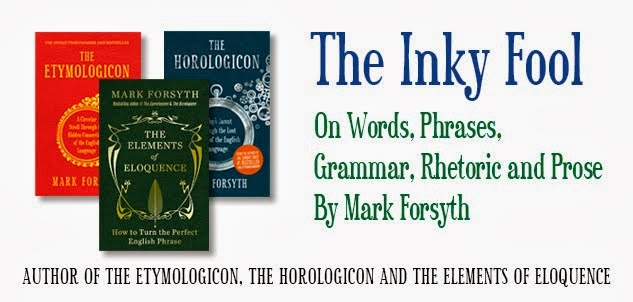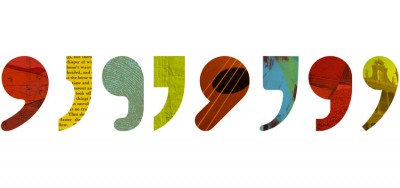Time Magazine names its “Person of the Year,” but did you know if also names its best bloggers of the year? Today, we are pleased to introduce one of the bloggers that made their 2013 list. Acclaimed author and all around lover of language Mark Forsyth is also the man behind the blog The Inky Fool.
From exploring the origins of words and phrases to guiding good grammar to the basics of correctly constructing a sentence, The Inky Fool is an enjoyable online resource for anyone interested in the English language. Forsyth uses concise and witty posts to explore everything you’ve ever wondered about the written and spoken word because he is curious about it too. Time sited his post on the hidden meanings behind the Christmas carol “Twelve Days of Christmas,” as both “shocking and shockingly obvious.” And his article for The Telegraph on the use of the word “so” (also posted on his blog) will leave you internally debating whether the conjunction really is useless afterall.

Credit: Mark Forsyth, The Inky Fool
Additionally, Forsyth shares his knowledge and love of etymology with readers offline in his books and other publications including: “The Etymologicon,” “The Horologicon,” “The Elements of Eloquence,” and “The Unknown Unknown.”
Today, we hear from Forsyth on how the Inky Fool got its start. He’ll share his favorite memorable phrases and why bookstores are still important in the digital age. And he’ll give advice for aspiring writers. We welcome his insights.
– – –

Credit: rgbstock
How did your blog The Inky Fool start? What caused you to have the idea to launch it?
It actually wasn’t my idea – an old friend of mine suggested starting a blog on language; and for the first few months we did it together. I simply found that I enjoyed it more, and had more time to spare. She left, but it’s still named after her. You see, she can’t go within 100 yards of a fountain pen without ending up covered in ink for some reason. So I used to call her the Inky Fool. The blog is still named after her, even though everyone thinks it’s me.
The Inky Fool is dedicated to Words, Phrases, Grammar, Rhetoric and Prose. Why this focus?
It’s all about how to construct a single sentence. The important thing about the blog is that it’s never about what is said, only about how it’s being said: the beautiful words that can be used, the strange ways of phrasing things, the comical origins of the words. The important thing, is that when, for example, I’m talking about a political slogan, I never ever say whether or not I agree with it. So many people who write about language feel that that gives them the right to opine about the world, which is terribly tedious.

Credit: Blogger
We notice that “words” are combined with phrases, grammar, rhetoric and prose. We’re focusing on words in June and July. Would you like to write a few words about words, why they are first on your list, why they matter and what’s so interesting about them from your point of view?
My favourite thing about words is the strange and funny origins, the stories behind them and the connections between them. I love the fact that ‘testament’ is related to ‘testicle,’ or that California is named after the Caliphate, or that ‘brackets’ comes from the Old French for ‘codpiece.’
What do like most about blogging?
The ability to write exactly how you want to. Most forms of writing, whether it’s newspapers, novels, or poetry, have a set style, a way of writing that’s expected of you. Blogging is young enough that these conventions haven’t had time to form. It’s perfect artistic freedom, not because you’re breaking the rules, but because there aren’t any rules there at all. It’s the new frontier.

Credit: Screen Rant, LLC
Your book the Elements of Eloquence goes beyond a love for words, it discusses what makes a phrases memorable. What are some of your favorite phrases and why do think they have stood the test of time?
My favourite figure of rhetoric is diacope. Bond, James Bond. Run, Forest, run. Fly, my pretties, fly. Captain, my captain. To be, or not to be. Game over, man, game over. It’s so simple and elegant, and pretty much guarantees you a memorable line. It’s not the phrase I love so much as the formula behind it (although I do of course love the phrases). It’s great to put together great lines from across history – demonstrating how the Bible, Dickens, Gershwin and Katy Perry are all using the same trick of progressio. Putting Paul McCartney next to St Paul and saying “Look, it’s the same thing.”
Your latest publication The Unknown Unknown: Bookshops and the Delight of Not Getting What You Wanted written for Independent Booksellers Week is in some ways is an ode to a place many believe is on its way out – the bookshop. You believe bookshops are alive and well. In the age of tablets and e-books, what are some of the ways that bookstores are surviving? What does “the bookshop” represent and what’s your best case scenario for them to succeed in an increasingly online world?
The important thing about a bookshop is that you can, by chance, come across a book that you never knew existed, on a subject you had never even thought of. You can’t get that on the internet, because on the internet you need to enter your search terms. A good bookshop can expand your mind. The dangerous thing about the internet is that it can fulfil all the desires that you already have, but it can’t give you new ones. If you were always able to get food just like Mama used to make it, you’d end up eating that rubbish for the rest of your life.
What book(s) have influenced you the most as a writer?
Three Men in a Boat.
You are active on social media, which often limits our words to 140 characters or less. How do you handle this challenge?
I rather like the challenge of expressing yourself as briefly as possib
What’s ahead for you and The Inky Fool this year? What should readers look forward to?
Right at the moment, nothing. I’ve just finished the publicity tour for “The Unknown Unknown,” and I’m going to take a break. In a few days time, I’m sure I’ll get bored and start something new. But for the moment, I’ve no idea what it will be.
What advice or resources do you have for aspiring writers and word lovers?
Make sure that you love language and love writing. Everybody wants to write a novel, but very few people want to write the next sentence. Life is all about process. Everyone would like to be Wimbledon Champion (or whatever), but almost all of us would die of boredom if we were asked to play tennis eight hours a day, seven days a week. If commas aren’t your idea of fun, you’re in trouble.

Credit: Candilynn Fite
– – –
To fall even more in love with language visit The Inky Fool and pick up a copy of one of Forsyth’s books here. Or, take a stroll through the aisles of your local bookstore.
As the Inky Fool has showed us words and phrases have many different origins and meanings. The words you use may mean more than you know. Next up we’ll explore the origins and meanings behind some of our favorite phrases and sayings. Stay tuned to make sure you are saying what you think you are saying.
Liz Faris, Account Manager
Collaborative Services, Inc.

Recent Comments